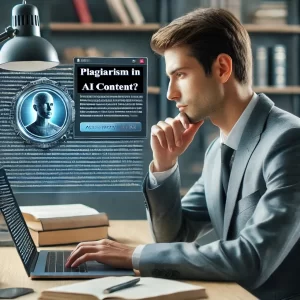
Why Plagiarism is Harmful to Developing Critical Thinking Skills
In both academic and professional settings, plagiarism is regarded as a significant violation, frequently leading to consequences and diminished trustworthiness. While much attention is given to the ethical and legal implications of plagiarism, another important aspect that is often overlooked is the detrimental effect plagiarism has on the development of critical thinking skills. Critical thinking, which involves analyzing, evaluating, and synthesizing information independently, is a vital skill for effective problem-solving, decision-making, and knowledge-building. When students engage in plagiarism, they undermine their academic integrity and hinder their ability to think independently and analyze critically.
Undermining Intellectual Engagement
Plagiarism undermines the essential intellectual involvement needed to truly comprehend, evaluate, and gain knowledge from information. Critical thinking involves students immersing themselves in content, evaluating arguments, and forming their own conclusions. When students engage in plagiarism, they forgo the opportunity to question, interpret, and internalize knowledge. Consequently, they struggle to cultivate the mental discipline required to grasp complex concepts, evaluate different viewpoints, and develop their own opinions.
Inhibiting Original Thought
A key aspect of critical thinking is the capacity to produce original ideas. When students copy someone else’s work, they forfeit the opportunity to engage in independent thinking. Plagiarism fosters reliance on the thoughts and interpretations of others, reducing self-assurance in one’s capacity to generate and share original ideas. As time goes on, this may result in diminished creativity and innovation, as students tend to depend more on external sources instead of delving into their own thoughts and insights.
Preventing the Development of Problem-Solving Skills
Critical thinking is directly associated with problem-solving. The process includes evaluating information, recognizing patterns, and forming logical conclusions. When students engage in plagiarism, they miss out on the essential analytical process of dissecting complex topics, which is crucial for effective problem-solving. When students copy work instead of trying to solve problems on their own, they forfeit important experiences that enhance their skills in overcoming challenges. This may lead to challenges in both academic and professional settings, as individuals may struggle to manage complex issues independently.
Discouraging In-Depth Research and Information Literacy
Conducting thorough research and integrating information from various sources is essential for effective critical thinking. It involves assessing the reliability of sources, recognizing various perspectives, and organizing results into a unified argument. Plagiarism undermines this important process, promoting a shallow interaction with materials rather than a deep exploration. This hinders students from cultivating information literacy—the skill to locate, assess, and utilize information efficiently. In the absence of these skills, students find it more challenging to make informed decisions and to differentiate between credible and unreliable information.
Reducing Accountability and Self-Reflection
Critical thinking is based on responsibility and introspection. The process includes evaluating comprehension, pinpointing knowledge gaps, and working towards enhancement. When students plagiarize, they miss the opportunity for self-assessment, as they are merely reproducing the work of others without truly engaging with the material. The absence of accountability can impede personal growth, preventing students from reflecting on their learning and identifying areas for improvement. When students fail to take responsibility for their own ideas and conclusions, they diminish their capacity for self-correction, which is essential to the critical thinking process.
Impairing Long-Term Learning and Academic Success
Critical thinking is based on responsibility and introspection. The process includes evaluating comprehension, pinpointing knowledge gaps, and working towards enhancement. When students plagiarize, they miss the opportunity for self-assessment, as they are merely reproducing the work of others without truly engaging with the material. The absence of accountability can impede personal growth, preventing students from reflecting on their learning and identifying areas for improvement. When students fail to take responsibility for their own ideas and conclusions, they diminish their capacity for self-correction, which is essential to the critical thinking process.
Conclusion
Plagiarism goes beyond being just an academic violation; it hinders intellectual growth and the development of critical thinking skills. When students engage in plagiarism, they forfeit the chance to question, analyze, and create, which are crucial for developing into independent, informed thinkers. Critical thinking is a skill developed gradually, necessitating curiosity, responsibility, and thorough engagement with information. When students embrace originality and integrity in their work, they build a strong foundation of critical thinking that will benefit them in all aspects of life. In today’s information-rich world, these skills are not only advantageous but crucial, making the dedication to authenticity in learning a worthwhile investment in both personal and professional development.

